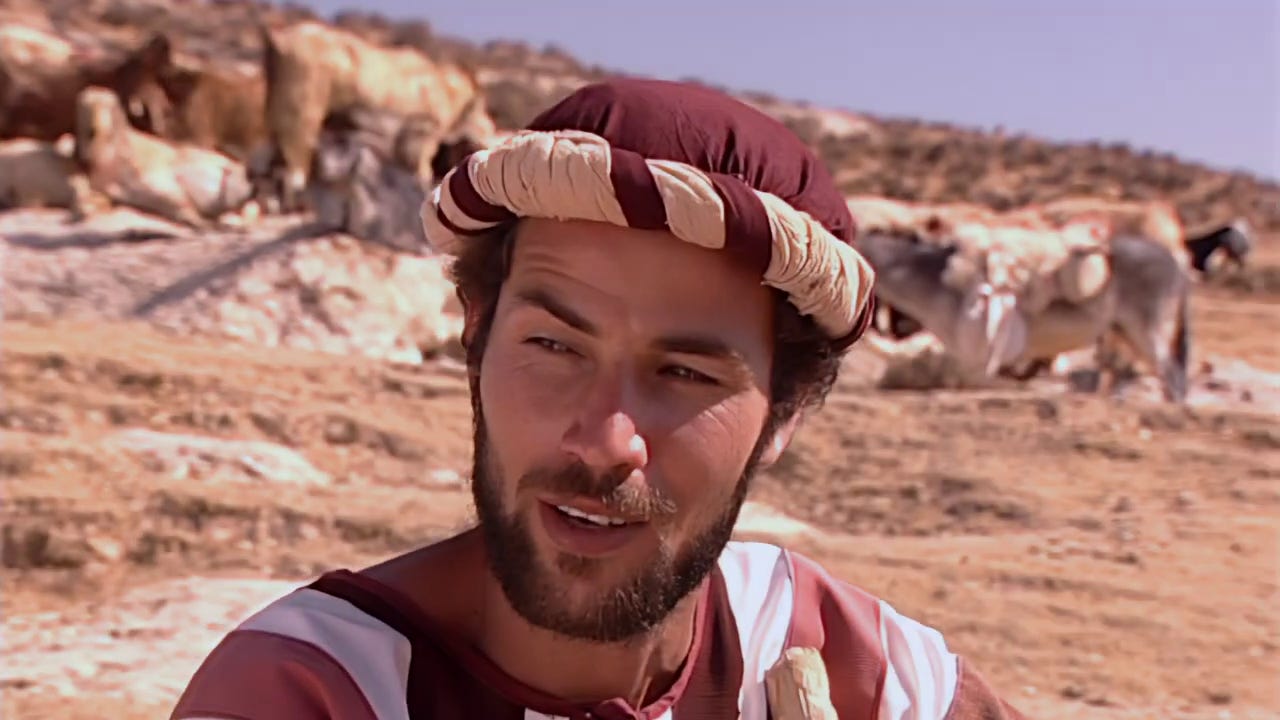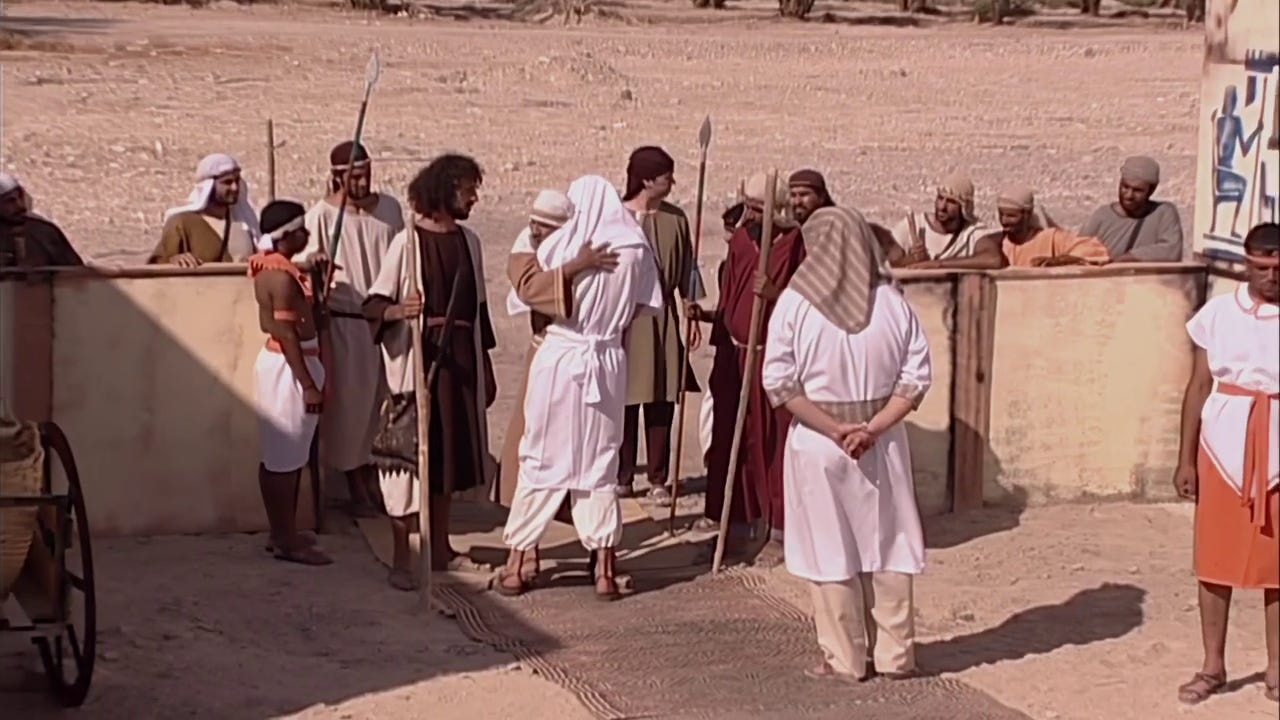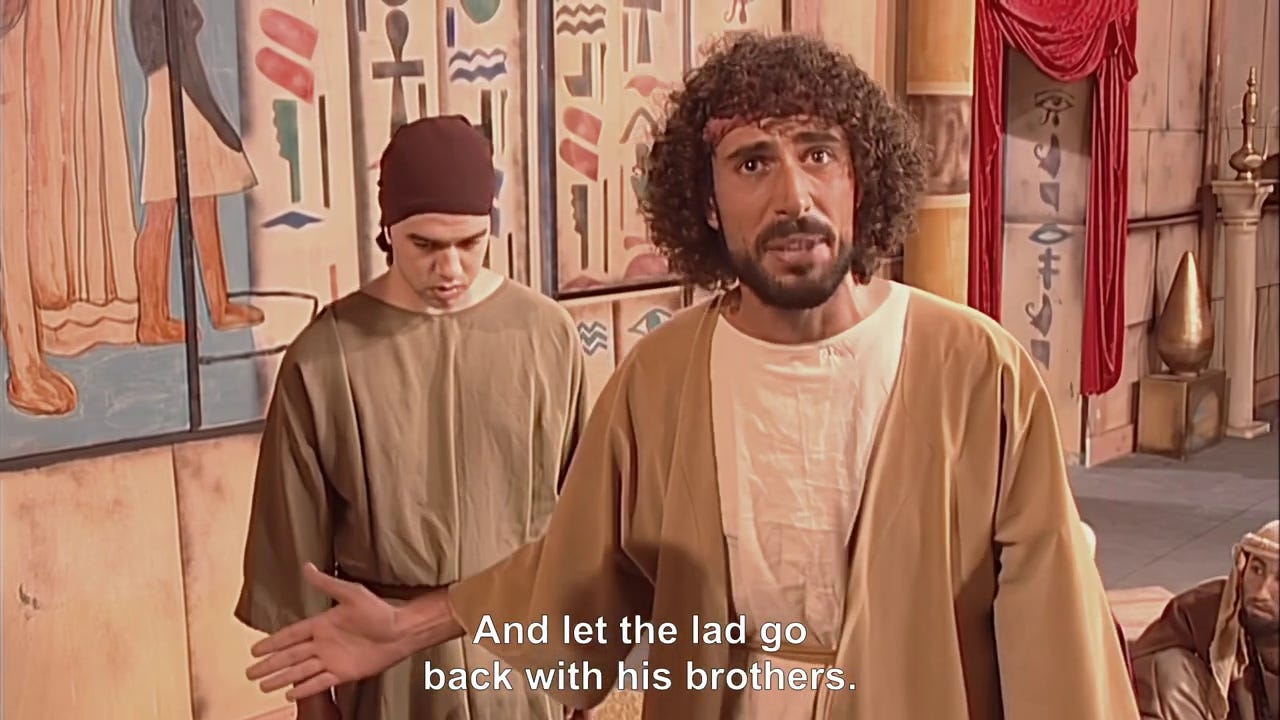God's Stories #5: Joseph
The tale about the young man sold into slavery by his ten jealous brothers just may be the most-filmed Bible story in the Middle East.
The story of Joseph and the ten jealous brothers who sold him into slavery just might be the most-filmed Bible story in the Middle East. Consider:
Joseph the Dreamer, aka Ba’al Hahalomot (dir. Yoram Gross, 1962), was the first-ever animated feature produced in Israel.
The Emigrant, aka Al Mohager (dir. Youssef Chahine, 1994), was a secularized version of the story, directed by an Egyptian from a Catholic background, that changed the names and some other details to get around the Sunni Muslim prohibition against depictions of the prophets but still proved quite controversial in its native country.
Prophet Joseph, aka Yūsofe Payāmbar (dir. Farajollah Salahshoor, 2008-2009), was a 45-episode TV series produced in Iran that told a version of the story informed by Shi’ite Islam, which does allow depictions of the prophets.
And now I’m writing about Joseph, the fifth entry in the ‘God’s Stories’ series of Arabic Bible movies produced and/or directed by the Jerusalem-born, Bulgaria-based Robert Savo. (The films were produced in the mid-’00s and recently got a digital upgrade with higher resolution, new visual effects, and some other tweaks.)
It’s easy to see why this story is so popular: it’s got a classic fall-and-rise narrative arc, similar in some ways to Ben-Hur or The Count of Monte Cristo, in which a man is betrayed and given up for dead but is ultimately exalted over the people who betrayed him—so it’s kind of a revenge story, but it’s also a story of redemption, as the hero, rather than destroy the people who betrayed him, is ultimately reconciled to them. Yes, he messes with their heads a little, but it’s all because he wants to confirm that they have repented of their treachery; it’s all to prove that reconciliation is possible.
All of this makes Joseph a very different film from the earlier films in the ‘God’s Stories’ series. The first four films—about Adam & Eve, Noah, Abraham, and Isaac—were based on fairly brief stories that needed fleshing out or, in the case of Abraham, were based on a collection of stories that needed some sort of connective tissue to work as a single unified drama. There was lots of room for creativity in those films, and the angles that they took were often quite impressive and illuminating.
The story of Joseph, on the other hand, already has a classic narrative arc, and there isn’t a whole lot that filmmakers can add to the story without getting in its way.
This isn’t to say that there is no room for creativity, per se: the Bible Collection’s Emmy-winning Joseph (dir. Roger Young, 1995) took the brilliant approach of fleshing out some of the other biblical stories about Joseph’s brothers—the ones in which they sleep with the wrong people or commit mass murder—to establish a contrast between Joseph’s virtue and his brothers’ lack of same, and to establish that Joseph’s brothers really were the kind of reprobates who would have sold him into slavery.
But that film was three hours long, and this film is only two, and so—unlike the other films in the ‘God’s Stories’ series so far—it gives us the same basic story that we’ve seen in other adaptations, while keeping its creative touches relatively small.
Some of those touches are still worth noting, though! For example:
Joseph’s grandfather Isaac is an active part of the story in its early scenes. This is highly unusual for a Joseph movie—presumably because Isaac’s death is mentioned in Genesis 35, and then the story of Joseph begins in Genesis 37, so the casual reader tends to assume that Isaac’s story and Joseph’s story didn’t really overlap at all. But if you pay attention to the timestamps in the book of Genesis—how old certain people were when other people were born, etc.—you realize that Isaac really would have been alive when Joseph’s story starts, and in fact he probably died around the same time that Joseph was let out of prison and became the second-most powerful man in Egypt.1 So, just as Savo’s previous movie about Isaac and his sons allowed for the fact that Abraham’s lifetime overlapped with that of Jacob and Esau, so too this film allows for the fact that Isaac’s lifetime overlapped with that of Joseph’s, well into Joseph’s adulthood.
This means Isaac gets to serve as a mentor to both Jacob and Joseph in this film—and the more I think about the way this film underlines the multi-generational aspect of Jacob’s family, the more I love it. Like other parents who sometimes ask the grandparents to talk to their kids, Jacob asks Isaac to speak to Joseph after Joseph starts talking about some of the dreams he’s been having. (Isaac advises Joseph to “keep God’s secrets” between him and God, and to guard his relationship with God “like a rare gem.”) Isaac also comments on the differences between his son and his grandson, when he tells Jacob, “You were crafty like a fox. This boy knows no guile.” And later, when Jacob grieves the news that Joseph has supposedly died, Isaac reminds Jacob to look after himself (“You can mourn, but you must eat”), and he offers Jacob a reason to hope, based on his own experience (“Abraham believed that God could raise me from the dead. So why don’t you leave Joseph’s situation in his hands”).
The film plays up Joseph’s organizational skills by showing how he marks the herds that have been assigned to the different brothers—and it plays up the rivalry of the brothers by showing how they steal animals from each other to finance their nights on the town. (There are basically four sub-clans within Jacob’s clan—one for each set of sons by Jacob’s wives or concubines—and the thefts tend to happen between those sub-clans.) The film also hints at the bad reputation that the brothers have in the broader community: When Joseph goes looking for the brothers, à la Genesis 37:16-17, the man he speaks to says everyone knows who the sons of Jacob are and tries to stay out of their way!
Joseph is a man of truth, integrity, and prayer. He prays when his brothers throw him in the well, and he entrusts himself to God’s mercy. He thanks God and prays for a clear conscience when Potiphar puts him in charge of the whole house. He prays for strength and courage in prison, and says, “I will tell the truth and always do justice with all men.” And Pharaoh is impressed by Joseph’s humility when Joseph gives God the credit for his ability to interpret dreams, instead of taking the credit for himself.
The role of Potiphar is expanded in this film, much the same way it was in The Bible Collection’s Joseph: First, the film establishes that Potiphar trusts Joseph and does not believe his wife’s accusation against Joseph—which makes sense, because how else could a slave accused of rape have escaped being executed? Then, it shows Potiphar taking care to ensure that Joseph’s talents don’t go to waste in the prison, as he tells the prison warden to put Joseph in charge of all the prison operations. (This goes beyond the book of Genesis, which allows the reader to think that Joseph was just so impressive that the prison warden, like Potiphar, figured it out on his own.) I think Potiphar might also be present in Pharaoh’s court when Joseph interprets the Pharaoh’s dreams. And finally, long after Joseph has been put in charge of the country, Potiphar apologizes for saving his own family’s reputation at Joseph’s expense.
I like the way Potiphar reacts when he confronts Joseph after his wife makes her accusation against Joseph. Potiphar says he has a lot of men who follow his every word, and he seems kind of stunned, like he can’t believe that Joseph—who is one of the best, most reliable, of his men—would be any different from those men. You almost get the sense that Potiphar needs Joseph to be innocent because, if the accusation is true, it would destabilize his world in general. If Joseph can let him down, is there anything or anyone he can rely upon?
The Pharaoh takes a sort of ‘What do I have to lose?’ approach to appointing Joseph his grand vizier. His advisors doubt that any drought could be as bad as the one that Joseph predicts, but the Pharaoh figures if Joseph is as good an organizer as everyone says, then hey, after seven years of plenty his coffers will be full, whether those years are followed by a famine or not.
The point is made, more than once, that the Egyptians do not like foreigners. When Joseph is still a slave, Potiphar says he wishes he could take Joseph with him to the palace to help manage things there, but non-Egyptians aren’t allowed in the palace. Later, when Joseph’s brothers come to Egypt to buy grain during the famine, there is some talk about how the Egyptians hate shepherds like them. But we don’t really see Joseph deal with this prejudice personally—and you’d think it might be something he’d run into, not least when he is put in charge of the entire country and he invites his father’s entire clan to move to Egypt indefinitely.
When Jacob gives his sons money to buy grain in Egypt, he gives one bag of money to Judah “the son of Leah”, another bag to Gad “the son of Zilpah”, and another to Dan… and I don’t believe he specifies that Dan’s mother is Bilhah. I wonder if that’s accidental or if it’s an intentional slight, tied to the fact that Bilhah slept with Reuben, who was Jacob’s son by Leah (Genesis 35:22). At any rate, as with the sheep, so with the money bags: they are assigned to different branches of the family based on wife/mother affiliation.
Joseph’s special affection for his full brother Benjamin—the only other son of Joseph’s mother Rachel—comes through nicely when he makes a point of personally putting an extra portion of food on Benjamin’s plate, at a point in the story when he still hasn’t revealed his true identity to his brothers.
A narrator kind of spoils the reunion between Jacob and Joseph at the end by telling us that Joseph will eventually be forgotten by the Pharaohs, and the shepherds will become slaves, waiting for Moses to lead them home. But hey, that is how this story fits into the larger Old Testament narrative.
There were a few things in this film that felt a little odd to me:
Curiously, there are virtually no women in this film. This surprises me, as the previous films in the ‘God’s Stories’ series have gone out of their way to flesh out characters like Eve, Sarah, Hagar, Rebekah, and the wives of Noah and his sons. But I don’t believe we ever see Jacob’s wives (though the brothers certainly get defensive when their siblings mock their mothers). We also don’t see Joseph’s wife or sons after he gets out of prison. Instead, all we get is Potiphar’s villainous wife, and only as much of her as the plot requires. (I think she’s in maybe a dozen minutes out of the film’s two-hour runtime.)
When we see Joseph’s brothers again in the latter part of the movie, after Joseph has been away from the family for at least two decades,2 it doesn’t seem like the brothers are all that much older—not even Benjamin, the youngest sibling of them all. I found myself wondering if Judah, in particular, seemed like someone who would have had three sons of marriageable age by now (two of whom were already dead by this point, as per Genesis 38).
When Joseph accuses the brothers of being spies, he says, “Who could believe such a story? One father with twelve sons?” One of the brothers replies that their father had four wives, but honestly, is that sort of explanation even necessary? I’ve been digging into the Mennonite side of my family tree lately (via Grandma’s Window), and you don’t have to go back very far to find families that had a dozen kids or more. Heck, just a little more than half a century ago, Robert F Kennedy had eleven children, all by the same mother, and he could have had more if he hadn’t been assassinated (his wife was pregnant at the time). And of course, Jacob had thirteen children that we know of, not twelve, once you count his daughter—but I don’t believe this film mentions her at all.
And that about covers it, I think.
And with this, the ‘God’s Stories’ series has finally finished the book of Genesis! There are nine films in the series altogether, and five of them are based on just that one book. So that might be a clue as to how essential or foundational those stories are, both for the people who made this series and for their target audience.
Next up: a look at the story of Moses, which spans four books of the Bible.
-
Bonus feature: I mentioned three other Middle Eastern film adaptations of the Joseph story at the top of this post. The Emigrant (aka Al Mohager, from Egypt) is currently available to watch on Netflix, at least in Canada. Prophet Joseph (aka Yūsofe Payāmbar, from Iran) is available on YouTube, in clips that are embedded at the bottom of my episode-by-episode posts on the series. And a 60-minute version of Joseph the Dreamer (aka Ba’al Hahalomot, from Israel)—which both the IMDb and Wikipedia say was originally 80 minutes long—is also on YouTube, and embedded below:
-
Several years ago I contributed a chapter on movies about the Genesis patriarchs to a book called The Bible in Motion: A Handbook of the Bible and Its Reception in Film. A couple decades ago, I also wrote brief reviews of Joseph (dir. Roger Young, 1995) and Joseph, King of Dreams (dir. Rob LaDuca & Robert C. Ramirez, 2000).
-
The ‘God’s Stories’ films can be purchased online at the GII Store. Note: It is possible that some of these titles might not be the upgraded versions of those films.
Bits of Joseph appear in this super-trailer for the ‘God’s Stories’ series:
Joseph also has its own trailer:
Isaac was 60 when Jacob was born (Genesis 25:26), and he was 180 when he died (Genesis 35:28)—so Jacob was 120 when Isaac died. And Jacob was 130 when he moved his family to Egypt (Genesis 47:9), which happened after there had been 7 years of plenty (Genesis 41:47) and 2 years of famine (Genesis 45:6)—so Jacob was 121 when the years of plenty began. Ergo, the seven years of plenty began just one year after Isaac died—and if the seven years of plenty began at the same time that Joseph got out of prison (as per Genesis 41:46-47), Joseph got out of prison just one year or so after his grandfather Isaac died.
Joseph was 17 when Jacob gave him the coat of many colours (Genesis 37:2-4), 30 when he started working for Pharaoh (Genesis 41:46), and he did not reveal himself to his brothers until after there had been 7 years of plenty (Genesis 41:47) and 2 years of famine (Genesis 45:6) during his rule, by which point he would have been 39—or 22 years older.








